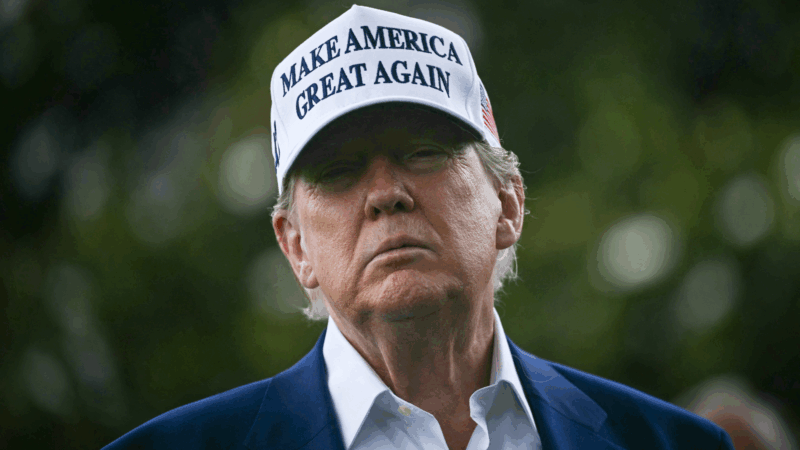MAGA is split over potential U.S. involvement in the Middle East
The MAGA movement is divided over how President Trump should react to escalating conflict between Israel — a U.S. ally — and Iran, including a suggestion that the U.S. could strike Iran. Republican strategist Sarah Longwell says a U.S. strike would be viewed as an “unforgivable sin” to a big part of Trump’s base.
“There were a lot of people attached to Donald Trump singularly because they believed that he was going to be an anti-war president,” Longwell told Morning Edition. “And so that would be seen as a fundamental betrayal in ways that economic policy isn’t.”
The White House said on Thursday that Trump will make a decision on whether the U.S. will strike Iran “within two weeks.” That announcement came amid growing concerns from some of the president’s most vocal supporters, including former Fox News host Tucker Carlson and former Trump senior adviser Steve Bannon. They argue Trump is betraying his America First principles.
The White House has dismissed any connection between the criticism and Trump’s delay in making a decision. Trump often gives “two weeks” as a deadline before taking action.
President Trump campaigned on ending foreign wars during his 2024 presidential run.
“We will measure our success not only by the battles we win, but also by the wars that we end, and perhaps most importantly, the wars we never get into,” Trump pledged during his second inauguration speech.
Though many MAGA figures have expressed disapproval of the U.S. getting involved in the conflict between Israel and Iran, others support U.S. involvement, including Sen. Lindsey Graham, R-S.C., and Fox News host Mark Levin, who have called for Trump to help Israel.
NPR’s Leila Fadel further discussed the MAGA divide with Longwell, a Trump critic and publisher of the conservative news and opinion website, The Bulwark.
The following excerpt has been edited for length and clarity.
Interview highlights
Leila Fadel: How big a deal is this that we’re seeing these fractures among Trump’s base over his indication that he might strike Iran?
Sarah Longwell: I’m not sure there’s an issue that fractures Trump’s new base more than foreign policy. And I think it goes back to 2016 and the way that Donald Trump became the Republican nominee in the first place, which was going after Jeb Bush because of the record of his brother in Iraq. Donald Trump tapped into something in the Republican Party, which was a real fatigue with these wars in the Middle East, and so he has built his brand. And then, in his second run, he brought in an entirely new part of his coalition that was really steeped in isolationism, which the Iraq wars represent everything that MAGA is sort of against in the Republican Party. I mean, it strikes right at the heart of the new MAGA ethos, which is these ‘no forever wars.’ And so when Donald Trump brings people like Tulsi Gabbard into his coalition and Joe Rogan, […] it really did put together a coalition of people that believed that the one thing Donald Trump wasn’t going to do was get us into these forever wars. And so flirting with it — for them — is an enormous betrayal.
Fadel: If he does get involved, or even if it goes towards regime change, this could shatter his base?
Longwell: I think so. There’s a reason that Trump has sort of had J.D. Vance out there trying to quell concerns with his base about this, because it has become an article of faith now in the party. I don’t think there’s been any bigger switch over the last 20 years in the Republican Party. But on foreign policy, it couldn’t look more different than it did ten or 20 years ago. And it will be an unforgivable sin to a lot of people. Donald Trump is great at commanding people to do what he wants. But I still think that for a big part of his base, they would not forgive him for some action in the Middle East.
Fadel: President Trump has delayed any final decision and has talked about a chance for negotiations. Do you think this is because of the criticism we’ve seen from the likes of Carlson and Bannon and other anti-war voices within the MAGA movement?
Longwell: I do think that Trump is swayed much more by these voices than he would like to say that he is. But I think one of the dangerous parts about Trump is that the kinds of people who have his ear, like Laura Loomer, big online influencers, those are the kind of people who move Trump’s decision making. So, I think his denials that this has nothing to do with it is wrong. I think Donald Trump likes the idea of being somebody who’s making big foreign policy decisions, but his base does not want that.
Fadel: And who do you think he is listening to at this moment?
Longwell: Well, part of what is interesting is Donald Trump does not have any real foundation or commitment to any kind of foreign policy idea. And so I think he’s probably listening a little bit to everyone, which is why he’s bouncing around.
Destinee Adams produced the web version of this piece and Treye Green edited it.
Transcript:
LEILA FADEL, HOST:
OK. Now I want to go just a little deeper on this rift among Trump supporters over the president indicating he might get involved militarily in this conflict between Israel and Iran. So we’ve got political strategist Sarah Longwell on the line. She’s a Trump critic and publisher of the center-right news and opinion website “The Bulwark.” Welcome to the program.
SARAH LONGWELL: Thanks for having me.
FADEL: So, Sarah, how big a deal is this that we’re seeing these fractures among Trump’s base over his indication that he might strike Iran?
LONGWELL: I’m not sure there’s a issue that fractures Trump’s new base more than foreign policy. And I think it goes back to 2016 and the way that Donald Trump became the Republican nominee in the first place, which was going after Jeb Bush. Because of the record of his brother in Iraq, Donald Trump tapped into something in the Republican Party, which was a real fatigue with these wars in the Middle East. And so he has built his brand and then ultimately, in his second run, brought in an entirely new part of his coalition that was really steeped in isolationism, which – you know, the Iraq wars represent everything that MAGA is sort of against in the Republican Party. Whether they use the word neocon or uniparty or establishment, I mean, it strikes right at the heart of the new MAGA ethos, which is these – no forever wars.
And so when Donald Trump brings people like Tulsi Gabbard into his coalition, and Joe Rogan and Theo Vao and a lot of these podcasters, it really did put together a coalition of people that believed that the one thing Donald Trump wasn’t going to do was get us into these forever wars. And so…
FADEL: OK.
LONGWELL: …Him flirting with it…
FADEL: Yeah.
LONGWELL: …For them is an enormous betrayal.
FADEL: So if he does then do something militarily, does get involved, or even if it goes towards regime change, this could shatter his base?
LONGWELL: I think so. And it also fractures things like – JD Vance really is one of the – there’s a reason that Trump has sort of had JD Vance out there, trying to quell concerns with his base about this, because it has become an article of faith now in the party that – and which is – I don’t think there’s any bigger switch over the last 20 years in the Republican Party. And there’s been a lot of changes in terms of what the party stands for. But on foreign policy, it couldn’t look more different than it did, you know, 10, 20 years ago, and it will be an unforgivable sin to a lot of people. And Donald Trump is great at commanding people to do what he wants. But I still think that for a big part of his base, they would not forgive him for some action in the Middle East.
FADEL: So then you see this very differently than discontent we’ve seen over other decisions. For example, tariff fines – tariffs – I know that that brought up a lot of issues. But this is very different to you?
LONGWELL: It’s different because this issue is what drove people into his coalition. There are a lot of people attached to Donald Trump singularly because they believed that he was going to be an anti-war president. And so that would be seen as a fundamental betrayal in ways that economic policy isn’t.
FADEL: So as we just heard, President Trump has delayed any final decision and has talked about a chance for negotiations. Do you think this is because of the criticism we’ve seen from the likes of Carlson and Bannon, and other anti-war voices within the MAGA movement?
LONGWELL: I do think that Trump is swayed much more by these voices than he would like to say that he is. But I think one of the dangerous parts about Trump is that, you know, the kinds of people who have his ear, like Laura Loomer, big online influencers – those are the kind of people who moves Trump’s decision-making. So I think his denials that this has nothing to do with it is wrong, especially because I actually do think one of Trump’s instincts is actually – I don’t think it’s about legacy. I think Donald Trump likes the idea of being somebody who’s making big foreign policy decisions, but his base does not want that.
FADEL: And who do you think he is listening to in this moment, in the few seconds we have left?
LONGWELL: Well, part of what is interesting is Donald Trump does not have any real foundational commitment to any kind of foreign policy idea. And so I think he’s probably listening a little bit to everyone, which is why he’s bouncing around.
FADEL: Sarah Longwell, political strategist with “The Bulwark.” Thank you for your time, and thanks for coming back on the program.
LONGWELL: Thank you.
Federal judge acknowledges ‘abusive workplace’ in court order
The order did not identify the judge in question but two sources familiar with the process told NPR it is U.S. District Judge Lydia Kay Griggsby, a Biden appointee.
Top 5 takeaways from the House immigration oversight hearing
The hearing underscored how deeply divided Republicans and Democrats remain on top-level changes to immigration enforcement in the wake of the shootings of two U.S. citizens.
Snowboarder Chloe Kim is chasing an Olympic gold three-peat with a torn labrum
At 25, Chloe Kim could become the first halfpipe snowboarder to win three consecutive Olympic golds.
Pakistan-Afghanistan border closures paralyze trade along a key route
Trucks have been stuck at the closed border since October. Both countries are facing economic losses with no end in sight. The Taliban also banned all Pakistani pharmaceutical imports to Afghanistan.
Malinowski concedes to Mejia in Democratic House special primary in New Jersey
With the race still too close to call, former congressman Tom Malinowski conceded to challenger Analilia Mejia in a Democratic primary to replace the seat vacated by New Jersey Gov. Mikie Sherrill.
A daughter reexamines her own family story in ‘The Mixed Marriage Project’
Dorothy Roberts' parents, a white anthropologist and a Black woman from Jamaica, spent years interviewing interracial couples in Chicago. Her memoir draws from their records.






